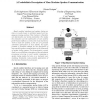Free Online Productivity Tools
i2Speak
i2Symbol
i2OCR
iTex2Img
iWeb2Print
iWeb2Shot
i2Type
iPdf2Split
iPdf2Merge
i2Bopomofo
i2Arabic
i2Style
i2Image
i2PDF
iLatex2Rtf
Sci2ools
126
click to vote
ICMCS
2005
IEEE
2005
IEEE
A Probabilistic Description of Man-Machine Spoken Communication
Speech enabled interfaces and spoken dialog systems are mostly based on statistical speech and language processing modules. Their behavior is therefore not deterministic and hardly predictable. This makes the simulation and the optimization of such systems performances difficult, as well as the reuse of previous work to build new systems. In the aim of a partially automated optimization of such systems, this paper presents a formalism attempt for the description of man-machine spoken communication in the framework of spoken dialog systems. This formalization is partly based on a probabilistic description of the information processing occurring in each module composing a spoken dialog system but also on a stochastic user modeling. Eventually, some possible applications of this theoretic framework are proposed.
| Added | 24 Jun 2010 |
| Updated | 24 Jun 2010 |
| Type | Conference |
| Year | 2005 |
| Where | ICMCS |
| Authors | Olivier Pietquin |
Comments (0)

